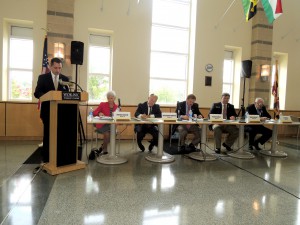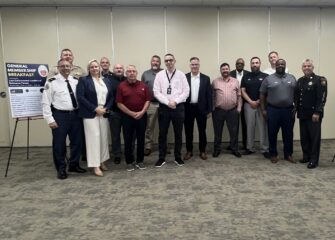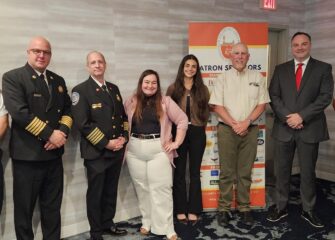
On Thursday, May 15th the Chamber hosted the Maryland State Senate Debate at Wor-Wic Community College. Candidates in attendance were Christopher Robinson, District 37 (Democratic), Richard F. Colburn, District 37 (Republican), Adelaide Eckardt, District 37 (Republican), Jim Mathias, District 28 (Democratic) and Mike McDermott, District 28 (Republican). Debate questions were provided from the audience. Below are questions left over due to time constraints during the debate. Responses were submitted from Adelaide Eckardt and Richard F. Colburn.
1. What part do you think a political figure’s personal life and ethics should play in this campaign?
Colburn: A political figure’s personal life/ethics should not play a role in any campaign. A personal matter is relevant only to those involved and should remain that way.
Eckardt: A political person’s life and ethics are always significant to a campaign. It is a matter of public trust and integrity. A violation of trust raises concerns about other situations since we all are role models whether we like it or not, regardless of our behavior. Behavior is how we each communicate who we are to others.
2. What have (or will) you do to improve the lives of more indigent members of the community?
Colburn: In the past session I proposed an amendment to the minimum wage bill that would increase the minimum wage to only $8.25, as Delaware currently has, instead of the meteoric jump to $10.10 per hour. A higher minimum wage equals higher unemployment; workers from surrounding states with a minimum wage lower than $10.10 consequently will come to Maryland and take away the gainful employment of Maryland’s own minimum wage workers.
I continue to fight for the repeal of the 1% sales tax increase (the current state sales tax is 6%) and return it to 5%.
Eckardt: Access to health care, mental health and substance use and abuse are areas that I have focused on through the years. Safe housing and homelessness are others I have worked on through bills and funding recently. Government does have a responsibility to address the needs of our most vulnerable populations.
3. Our current government has recognized the power of the Arts as an economic and academic engine, allowing citizens to be proud and successful to live in Maryland as it ranks one of the leading states in the nation for funding for the arts. What will you do going forward to ensure this continues?
Colburn: As a senior member of the State Senate and ranking Republican on the Senate’s Budget and Taxation Committee, I will continue to ensure money is allocated for the Arts in the Governor’s operating budget.
Eckardt: The arts are important both individually and to the well being of the community. I have supported funding to the Arts through the years as well as focused on the creation and development of the Arts and Entertainment Districts on the Shore. Many small businesses have been created focused on the arts that become a vehicle for attracting and retaining our young. I have also supported arts integration in our schools as it fosters left brain –right brain development and can captivate our young people to stay in school. I particularly like the Music and Arts Charter school concept.
4. Job skills are changing. Beyond traditional K-12 education, what role do you think other Education Institutions play in training our job force and what should Annapolis do to help those institutions fill this need?
Colburn: I agree with meeting the funding requirements as put forth by Senator Cade’s funding formula so that we can put more emphasis on our community colleges like Wor-Wic and Chesapeake community colleges.
Eckardt: Our community colleges are expanding their role and will continue as increasing numbers of students choose Community colleges due to the rising cost of education. Adequate funding of Community Colleges due to their increasing enrollment and community role of workforce training. Specialized academies, charter schools with a career focus are possibilities basic education . Digital learning has yet to come into it’s own and can completely reshape education in the future. Now is the time to think outside the box and plan for the future.
5. For those candidates who were in the House or the Senate these past four years: How many of the bills you submitted have made it to a vote and how many of those passed?
Colburn: I introduced 13 bills in the past legislative session that passed the General Assembly. My challenger, on the other hand, introduced four in the House of Delegates, none of which made it through the House.
Eckardt: 2011 18 sponsored bills: 4passed; 2 done through regulation by departments; 4 withdrawn and 5 no action; 13 of 68 co-sponsored bills passed.
2012 13 sponsored bills: 8 passed: 2 withdrawn, 3 failed; Co sponsored 18 of 95 passed.
2013 9 sponsored bills: 5passed; 2 included in the budget; 1 added to budget as language and 1 resolved through MDOT. 20 of 90 cosponsored bills passed
2014 10 sponsored bills: 6 passed; 1 withdrawn; 1 added through budget language; 1 no action ; 1 failed; 25 of 100 cosponsored passed.




